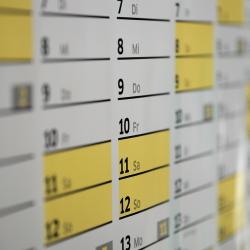How to Plan Your Week for Maximum Efficiency
In a world that never sleeps, where demands on our time seem to multiply exponentially, mastering the art of weekly planning is critical for success and sanity. Whether you're a working professional, a student, or someone juggling multiple roles, structuring your week effectively can significantly enhance productivity, reduce stress, and help achieve your goals. This article will explore strategies to plan your week for maximum efficiency, turning chaos into clarity.
- Start with a Reflection
Before planning the upcoming week, take a moment to reflect on the past one. Identify what worked well and what didn't. Consider the moments when you felt most productive and those when you felt overwhelmed. Understanding these patterns can provide valuable insights for optimizing your time and tasks.
- Set Clear Goals
Determine what you want to accomplish in the week ahead. Divide these goals into categories: work, personal development, health, relationships, and leisure. Prioritize them, with a focus on what's urgent and important. Having a clear vision of your objectives will guide your decisions and actions throughout the week.
- Block Your Time
Time blocking is an effective way to ensure that your most important tasks get the attention they deserve. Allocate specific time slots for different activities, assigning high-value tasks to your peak productivity hours. This method not only prevents overcommitting but also creates a structured yet flexible framework for your week.
- Batch Similar Tasks
Group similar activities together to increase efficiency. For instance, dedicate one block of time for emails, another for meetings, and another for focused work. By minimizing the constant switching between different types of tasks, you reduce mental fatigue and enhance concentration.
- Leverage Technology
Use planning tools and apps to keep track of your schedule. Digital calendars, task management apps like Trello or Asana, and productivity tools like Notion can help you visualize your week, set reminders, and ensure nothing falls through the cracks. Sync your calendar with all your devices for easy access and updates.
- Build in Buffer Time
Life is unpredictable, and plans can change. Including buffer time between tasks and appointments prevents a minor setback from derailing your entire day. It also allows time for reflection, quick breaks, or unexpected errands that may arise.
- Plan for Breaks and Downtime
Efficiency isn't just about doing more; it's about doing better. Schedule regular breaks to recharge. Consider techniques like the Pomodoro Technique, which involves 25 minutes of focused work followed by a 5-minute break. Also, allocate downtime for leisure activities and self-care, which are crucial for maintaining overall productivity and mental health.
- Review and Adjust
At the end of each day, review your progress. Celebrate your achievements and understand where you may have fallen short. Use these daily reviews to make minor adjustments to your plan. A weekly review at the end of each week helps in adapting your strategy for the following week based on what you've learned.
- Stay Flexible
While planning is essential, it's equally important to remain adaptable. Unexpected events can arise, and priorities may shift. A rigid schedule can cause unnecessary stress, so be prepared to adjust your plans as needed while keeping your core objectives in focus.
Conclusion
Efficient weekly planning is a skill that can transform your life, providing clarity, purpose, and productivity. By setting clear goals, blocking your time, using technology, and allowing for flexibility, you can design a week that maximizes your potential. Embrace the practice of reflection and adjustment, and you'll find that with each passing week, you'll be better equipped to handle the demands of modern life with confidence and ease.






















